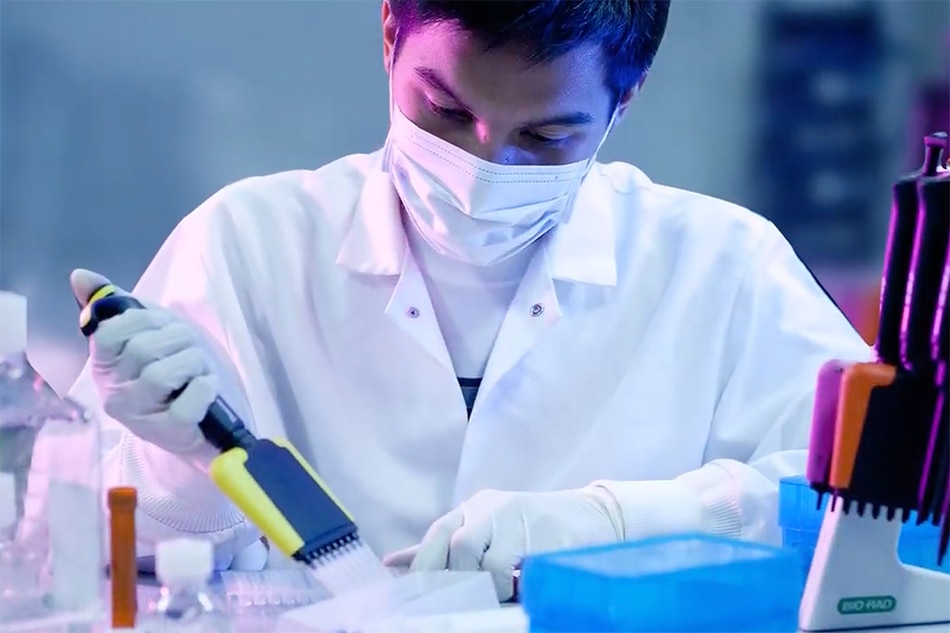PH sequencing less than 1pct of COVID-19 cases: official | ABS-CBN
ADVERTISEMENT

Welcome, Kapamilya! We use cookies to improve your browsing experience. Continuing to use this site means you agree to our use of cookies. Tell me more!
PH sequencing less than 1pct of COVID-19 cases: official
PH sequencing less than 1pct of COVID-19 cases: official
Katrina Domingo,
ABS-CBN News
Published Jun 23, 2021 03:56 PM PHT
|
Updated Jun 23, 2021 05:03 PM PHT
MANILA - The Philippines needs to sequence more samples from COVID-19 patients to ensure that more contagious variants of the disease would not spread in communities, an official said, Wednesday.
MANILA - The Philippines needs to sequence more samples from COVID-19 patients to ensure that more contagious variants of the disease would not spread in communities, an official said, Wednesday.
The country has been sequencing 750 samples a week, or less than 1 percent of the cases in the country, said Dr. Eva Maria C. Cutiongco-de la Paz, Director for the Genomics Health Program of the Philippine Genome Center.
The country has been sequencing 750 samples a week, or less than 1 percent of the cases in the country, said Dr. Eva Maria C. Cutiongco-de la Paz, Director for the Genomics Health Program of the Philippine Genome Center.
The ideal genome sequecing rate is at least 5 percent, she told reporters in an online press conference.
The ideal genome sequecing rate is at least 5 percent, she told reporters in an online press conference.
"We are sequencing not enough, but we also have to balance it with our resources," she said.
"We are sequencing not enough, but we also have to balance it with our resources," she said.
ADVERTISEMENT
"We have to be smarter in what samples we take," she said.
"We have to be smarter in what samples we take," she said.
The United Kingdom has sequenced 30 percent of COVID-19 cases, while the United States sequences about 5 percent, she said.
The United Kingdom has sequenced 30 percent of COVID-19 cases, while the United States sequences about 5 percent, she said.
The Philippines has a limited genome sequencing capacity because the country only has one NovaSeq, a machine responsible for whole-genome sequencing, de la Paz said.
The Philippines has a limited genome sequencing capacity because the country only has one NovaSeq, a machine responsible for whole-genome sequencing, de la Paz said.
One NovaSeq can sequence up to 750 samples per week, she said.
One NovaSeq can sequence up to 750 samples per week, she said.
"If we have the opportunity to get more sequencers, why not? But it is costly," she said, noting the Philippines got the machine 5 years ago for P89 million.
"If we have the opportunity to get more sequencers, why not? But it is costly," she said, noting the Philippines got the machine 5 years ago for P89 million.
Genome sequencing kits and other consumables also add to the cost, she said.
Genome sequencing kits and other consumables also add to the cost, she said.
"We are a country of limited resources and yet compared to other countries, nakakapag-sequence naman tayo," she noted.
"We are a country of limited resources and yet compared to other countries, nakakapag-sequence naman tayo," she noted.
The Philippine Genome Center encountered "logistical problems" in the procurement of sequencing kits, Health Undersecretary Maria Rosario Vergeire said in an earlier interview.
The Philippine Genome Center encountered "logistical problems" in the procurement of sequencing kits, Health Undersecretary Maria Rosario Vergeire said in an earlier interview.
The fresh supplies are expected to arrive this month to help the center continue its efforts in detecting which COVID-19 variants are in the country, Vergeire said.
The fresh supplies are expected to arrive this month to help the center continue its efforts in detecting which COVID-19 variants are in the country, Vergeire said.
Health officials have been cautioning the public against the presence of foreign variants as these are more contagious than the original coronavirus strain.
Health officials have been cautioning the public against the presence of foreign variants as these are more contagious than the original coronavirus strain.
The Alpha variant (B.1.1.7, first detected in the UK), is 60 times more contagious than the original virus, while the Delta variant (B.1.617.2, first detected in India), is 60 times more communicable than the Alpha variant, according to the Health Department.
The Alpha variant (B.1.1.7, first detected in the UK), is 60 times more contagious than the original virus, while the Delta variant (B.1.617.2, first detected in India), is 60 times more communicable than the Alpha variant, according to the Health Department.
As of June 17, the PGC confirmed 17 cases of the Delta variant in the country. Of these cases, 1 died, 1 is still confined in a hospital, while the rest have recuperated from the disease.
As of June 17, the PGC confirmed 17 cases of the Delta variant in the country. Of these cases, 1 died, 1 is still confined in a hospital, while the rest have recuperated from the disease.
There are also 1,085 Alpha variant carriers, while 1,267 others were infected with the Beta variant (B.1.351, first detected in South Africa).
There are also 1,085 Alpha variant carriers, while 1,267 others were infected with the Beta variant (B.1.351, first detected in South Africa).
In February 2021, the national government allocated P362 million to fund the country's genome sequencing efforts for the whole year.
In February 2021, the national government allocated P362 million to fund the country's genome sequencing efforts for the whole year.
RELATED VIDEO
Read More:
COVID-19
coronavirus
genome sequencing
COVID-19 variants
Delta variant
Philippine Genome Center
ADVERTISEMENT
ADVERTISEMENT



